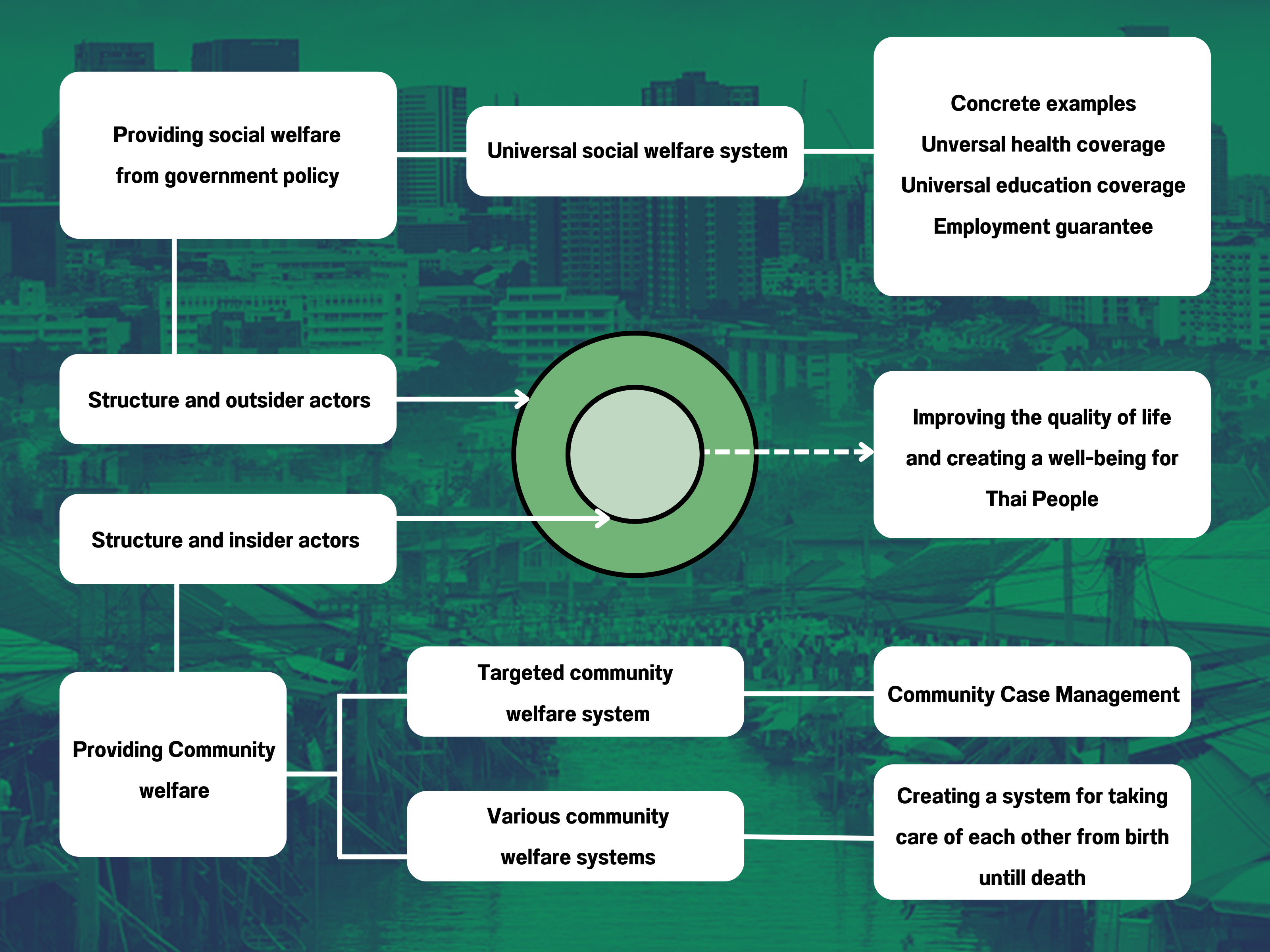Developing a Basic Conceptual Framework for Social Welfare Management in Thailand
Main Article Content
Abstract
Objectives: This academic paper aims to propose a basic conceptual framework for social welfare management in Thailand.
Methods: The study utilized data collection methods from documents and relevant research, including books, academic journals, research reports, and theses. Data obtained from both domestic and international sources were analyzed and interpreted. Social phenomena and empirical data were examined to understand various changes before synthesizing them into conclusions and recommendations.
Results: Research results revealed significant differences in social welfare management principles based on democratic socialism, neo-liberalism, and the third way. The challenge in formulating a basic conceptual framework for social welfare management in Thailand is integrating these three models: 1) based on democratic socialism principle, which emphasizes equalization and redistribution as key to promoting social welfare; 2) based on neo-liberalism, which focuses on supporting vulnerable groups as central to the social welfare process; and 3)based on third way principle, which highlights the importance of social partnerships for involving people in creating and maintaining the rules for social welfare management.
Application of this study: It is hoped that this study will play a crucial role in raising awareness about the importance of questioning and developing social welfare policies in Thailand.
Downloads
Article Details

This work is licensed under a Creative Commons Attribution-NonCommercial-NoDerivatives 4.0 International License.
References
Boston, J. (1993). Reshaping social policy in New Zealand. Fiscal Studies, 14(3), 64-85. DOI: https://doi.org/10.1111/j.1475-5890.1993.tb00487.x
Changprachak, S. (2020). Thailand’ s Social Welfare in The Developmental Process. MCU Social Science Review, 9(2), 315-328.
Community Organizations Development Institute. (2018). Operational Manual for Supporting Community Welfare Projects. Bangkok: Community Organization Development Institute (Public Organization).
George, V. & Wilding, P. (1994). Welfare & Ideology. London: Harvester Wheatsheaf.
Giddens, A. (1990). The Consequences of Modernity. Cambridge: Polity Press.
Giddens, A. (1994). Beyond Left and Right. Cambridge: Polity Press.
Jitsuchon, S. (2019). Dismantle taxes, create welfare, and spread the gap between the rich and the poor. Retrieved 10 April 2024, from https://waymagazine.org/interview-somchai-welfare/
Jitsuchon, S. (2023). The possibility of social welfare-education to stop the cycle of poverty and inequality. Retrieved 12 April 2024, from https://www.eef.or.th/article-somchai-jitsuchon-interview/
Kumhom, R. (2014). Social welfare and Thai society. Bangkok: Samlada Limited Partnership.
Lertnitat, C, & Jitsuchon, S. (2020). Vulnerability of vulnerable groups of people under COVID-19. Retrieved 14 April 2024, from https://tdri.or.th/2020/06/impact-of-covid19-on-vulnerable-groups/
Nontapattamadul, K. (2007). Critical theory in social policy and planning. Pathum Thani: Thammasat University Press.
Nontapattamadul, K. (2011). Social policy and social welfare. Pathum Thani: Thammasat University Press.
Norrat, C. (2003). Thai rural community welfare. Doctoral Dissertation, Ph.D. in Social work, Thammasat University. (In Thai)
Office of the Nation Economic and Social Development Board. (2001). The Ninth National Economic and Social Development Plan (2002-2006). Bangkok: Office of the Nation Economic and Social Development Board.
Office of the National Economic and Social Development Council. (2018). Poverty and Inequality Reports 2017. Bangkok: Office of the National Economic and Social Development Council.
Office of the National Economic and Social Development Council. (2019). Poverty and Inequality Reports 2018. Bangkok: Office of the National Economic and Social Development Council.
Office of the National Economic and Social Development Council. (2020). Poverty and Inequality Reports 2019. Bangkok: Office of the National Economic and Social Development Council.
Office of the National Economic and Social Development Council. (2021). Poverty and Inequality Reports 2020. Bangkok: Office of the National Economic and Social Development Council.
Office of the National Economic and Social Development Council. (2022). Poverty and Inequality Reports 2021. Bangkok: Office of the National Economic and Social Development Council.
Office of the National Economic and Social Development Council. (2023). Poverty and Inequality Reports 2022. Bangkok: Office of the National Economic and Social Development Council.
Petprasert, N. (2003). Synthesizing the overall picture of the development of the welfare system for the poor and vulnerable people in Thai society. Bangkok: Edison Press Products Company Limited.
Suntikul, P. (2013). Social welfare and human security in the era of globalization. Bangkok: M&M Laser Print.
Supakitpaisan, K. (2020). The Development of Fair Social Welfare for Solving Inequality Problems. Social work and social welfare: Unlocking inequality towards sustainability, pp. 83-99, National academic conference, January 24, 2020. Bangkok, Thailand.
Supakitpaisan, K. (2022). Development of social capital concept and fairness concept in community welfare provision for improving quality of life: a case study of Ban Mai Thai Pattana Nong Takhian Bon Subdistrict Watthana Nakhon District Sa Kaeo Province. Doctoral Dissertation, Ph.D. in Philosophy (Social Policy), Thammasat University, Thailand. (In Thai)
Supakitpaisan, K. (2024). Figure 3 shows the roles for providing social welfare under the pluralism model.
Supakitpaisan, K. (2024). Figure 4 shows principles and models of social welfare management.
Supakitpaisan, K. (2024). Figure 5 shows a basic conceptual framework for social welfare management in Thailand.
Thailand Development Research Institute. (2011). Social welfare options for Thai society. Bangkok: Thailand Development Research Institute.
Thammaboosadee, S. (2024). Economic outline and current Thai welfare state policies. Retrieved 17 April 2024, from https://pridi.or.th/th/content/2024/04/1927


